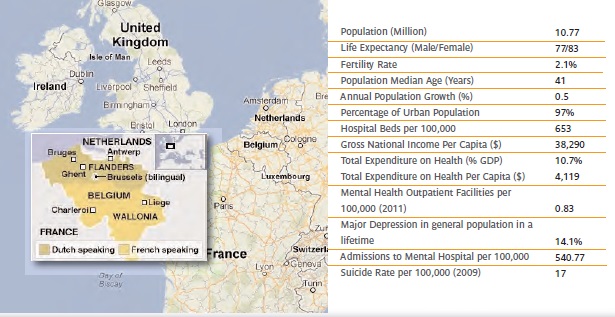Belgium, like many Northern European Countries, is regarded as having a very high standard of living. Belgium has a complex history as a relatively new country with three defined communities; the Flemish region in the north (Dutch speaking), the Walloon region in the south (French and German speaking) and the Brussels region (bilingual). These three communities, defined by their language, have political powers over areas in education, culture and ‘social matters’ such as families and healthcare. With its capital Brussels, also the capital of the European Union, there are numerous policymakers, funding agencies, and research projects for the healthcare sector on an international scale.
Brussels Life Science Incubator (BLSI)
The new era in medicine has arrived and the empowered patient is born. This patient is someone who is increasingly involved in his or her own treatment, assisting the physician with medical care. “Tomorrow’s World” is now becoming the present with developments in technologies such as Smartphones, tablets and cloud computing. Advanced Technology Healthcare (ATH) is seen as the way forward to improve patient treatments and to reduced costs on the increasingly demanding health sector.
Brussels, Europe’s capital, has increasingly focused on ATH, locally and globally. The European Commission sees SMEs as drivers of new innovation and growth of the ATH sector and has set out policies to assist SMEs in their growth and development. On the Woluwe Saint Lambert campus of the Université Catholique de Louvain (UCL), the Brussels Life Science Incubator (BLSI) opened in December 2011, to provide a dynamic environment for start-up SMEs and business leaders active in the field of biotechnology, medical devices, and IT solutions for the Health Sector. BLSI helps start-ups and SMEs to develop new activities by providing the right environment and personalized support services. Two such Advanced Technological Healthcare SMEs housed in BLSI are Esperity and Virtual Reality Medical Institute (VRMI). (http://www.blsincubator.com)
Virtual Reality Medical Institute (VRMI)
One of the first companies selected for inclusion in the incubator was Virtual Reality Medical Institute (VRMI). VRMI is a Belgian SME with expertise in simulation technologies in three main areas: 1) treating patients with stress, anxiety, and trauma, 2) training for military medical and civilian first responder populations, and 3) enhancing medical educational programs. A relatively new start-up, VRMI has established affiliates in both China and the U.S.
The connectivity of Brussels, the capital of the EU, makes location at BLSI even more important. This SME envisages the goals of the EU in developing the healthcare of the future. VRMI serves on EU grants as both a Dissemination and Exploitation Workpackage Leader and a Clinical Partner, using a Combined Communications Platform of an annual international conference, specialized workshops, clinician training courses, a peer-reviewed scientific journal, a quarterly magazine, and a website information portal as tools to inform and educate the general public, policymakers, funding agents, industry and academia. In addition, VRMI has a private clinic at BLSI for patient care to transition protocols and clinical products developed in the laboratory setting into actual clinical use. Having been involved in R&D projects in Europe, Asia, and the U.S. for the past 25 years, the principals of VRMI have won over 50 competitive government contracts and are now actively involved in marketing the developed products and protocols.
VRMI is currently involved with a particularly high profile project funded by DG-CONNECT entitled INTERSTRESS. INTERSTRESS is working with a new e-Health concept called Interreality and is porting physiology and virtual reality to mobile platforms to provide easier access to stress prevention and stress management tools for individual citizens. Selected as a 2012 winner for the World Summit Award on mHealth, INTERSTRESS will complete its clinical and marketing trials in December 2013. (http://www.vrphobia.eu)
Esperity
Esperity, also based at the BLSI, is a new startup SME providing a platform for cancer patients to report their treatment outcomes and to connect with other patients similar to themselves. It is the aim of Esperity to dig into this data to find correlations between influencing variables on cancer treatment outcome. Patients all over the world can enter data such as cancer type, cancer subtype, treatment, medical history, medication schemes, side effects and quality of life indicators. With the use of Microsoft cloud technology, patients’ data can be scaled and relocated depending on their location. By analyzing the data of the users, certain patterns will become visible. For example, patients with a specific type of breast cancer taking an anti-diabetic drug might report totally different side effects and quality of life indicators compared to patients taking an anti-hypertension drug. Being based at BLSI provides the environment and location to develop the SME to a wider market.
Esperity, together with major pharmaceutical players, plan to trial patients with the optimal uptake of medication and the use of the online platform. The focus for the future is to maximize the use of advanced technology healthcare in the treatment, training and data management of the patients. (http://esperity.com)
There is a technological shift taking place within healthcare and technology, and this is increasingly becoming accepted by mainstream patients. Together with the increased possibilities that modern technology offers, a huge boom of medical data is to be expected. Interpretation of all this information is key, together with using this information for feedback to patients to maximize the effectiveness of technology. The ‘ease-of-use’ of future technologies is vitally important to meet the requirements of the consumers. Cloud computing will hopefully bridge the gap in access to new technologies whilst reducing investment costs making a more accessible entry point.
Centre of the EU
With Belgium being situated at the heart of Western Europe and Brussels its Capital, the main European institutions, major companies and research institutes all over the world have delegates in and around Brussels. One group with headquarters in Brussels is the International Association of CyberPsychology, Training, & Rehabilitation (iACTOR), which is a members-based international non-profit association incorporated in Belgium. iACToR is designed to promote Virtual Reality and other advanced technologies as adjuncts to more traditional forms of therapy, training, education, and rehabilitation. It also investigates how new social networking tools are impacting (positively and negatively) individual behavior, interpersonal relationships and society. iACToR members are working to develop a “roadmap” for the future of this rapidly growing area and participate in annual conferences and online forums to share ideas and consolidate experiences. (http://iactor.ning.com)
Being located in Belgium gives institutions the benefit of easier access to an international stage. Projects are not limited to which country they are located in and can find the best researchers within the EU rather than their home state. Increasing demands on healthcare have created a need for an overall shift from institutional healthcare settings to everyday environments, and from treatment to a preventive approach based on new personalized healthcare technologies. Using new technologies will help the treatment of patients as well as cutting ever increasing costs. One area that has empowered the patient is Virtual Reality, which is increasingly being researched and applied within the healthcare field.
The Strategic Approach for the EU for 2008-2013 stated that ‘health is the greatest wealth’ and that ‘health is important for the wellbeing of individuals and society, but a healthy population is also a prerequisite for economic productivity and prosperity’. Esperity and VRMI, both located at the Brussels Life Science Incubator (BLSI), have the benefits of being closely linked to UCL, as well as outstanding research facilities throughout Belgium. Networking events organized by BLSI also help SMEs establish access to funding agencies such as Innoviris and IWT that promote collaboration between these research facilities and SME’s.
Having access to the European Commission and EU funds enables SMEs to push forward research for Advanced Technology Healthcare as well as providing the basis for international collaborations. These technologies enable treatments using Virtual Reality, the Internet, and Cloud Computing to be accessible whenever and wherever, creating a greater link between patient and physician.
Moving Forward
As Europe is already pushing for stronger collaboration between academic / research institutes and SMEs in its Horizon 2020 framework, many hope the fruits of this initiative will be harvested soon, with a positive effect on the European economy. Being based at the Brussels Life Science Incubator optimizes SMEs abilities to collaborate with high quality research facilities locally and internationally with enhanced access to relevant European departments and Commissions. Designed to help new startups with some of the most difficult issues they face by providing workspace, support services, and networking opportunities, entrepreneurs have more time available to focus on their subject matter expertise and the enthusiasm needed to grow their businesses.
Europe, as does the U.S., agrees that small business innovation remains one of the keys to moving our countries forward.
Sources:
Personal communication with Mitchell Silva, World Health Organiszation (WHO), Brussels Life Sciences Incubator (BLSI) and Europa.eu
AUTHOR:
Scott Allison
C&R Magazine
www.vrphobia.eu
editorial@vrphobia.eu
About Brenda Wiederhold
President of Virtual Reality Medical Institute (VRMI) in Brussels, Belgium.
Executive VP Virtual Reality Medical Center (VRMC), based in San Diego and Los Angeles, California.
CEO of Interactive Media Institute a 501c3 non-profit
Clinical Instructor in Department of Psychiatry at UCSD
Founder of CyberPsychology, CyberTherapy, & Social Networking Conference
Visiting Professor at Catholic University Milan.







